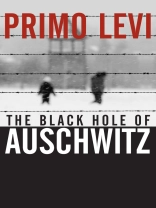The Black Hole of Auschwitz brings together Levi’s
writings on the Holocaust and his experiences of the concentration
camp, as well as those on his own accidental status as a writer and
his chosen profession of chemist. In this book Levi rails
intelligently and eloquently against what he saw as the ebb of
compassion and interest in the Holocaust, and the yearly assault on
the veracity and moral weight of the testimonies of its survivors.
For Levi, to keep writing and, through writing, to understand why
the Holocaust could happen, was nothing less than a safeguard
against the loss of a collective memory of the atrocities
perpetrated against the Jewish people.
This moving book not only reveals the care and conviction with
which he wrote about the Holocaust, but also shows the range of
Levi’s interests and the skill, thoughtfulness and
sensitivity he brought to all his subjects. The consistency and
moral force of Levi’s reflections and the clarity and
intimacy of his style will make this book appeal to a wide
readership, including those who have read and been moved by his
masterpiece If This is a Man.
İçerik tablosu
Through the Looking Glass: Preface to the Italian Edition.
Note to the Texts.
PART I: THE BLACK HOLE OF AUSCHWITZ.
1. Deportees. Anniversary.
2. The Monument at Auschwitz.
3. ‘Arbeit Macht Frei’.
4. The Time of Swastikas.
5. Preface to the German Edition of If This is a Man.
6. Preface to the School Edition of the Truce.
7. Resistance in the Camps.
8. Preface to Y. Katzenelson’s The Song of the Murdered
Jewish People.
9. Note to the Theatre Version of If This is a Man.
10. Preface to L.Poliakov’s Auschwitz.
11. To the Young: Preface to If This a Man.
12. A Past We Thought Would Never Return.
13. Preface to J. Presser’s The Night of the
Girondins.
14. Films and Swastikas.
15. Letter to Latanzio: ‘Resign’.
16. Women to the Slaughter.
17. So That the SS do not Return.
18. It began with Kristallnacht.
19. Jean Améry, Philosopher and Suicide.
20. But We Were There.
21. Concentration Camp at Italy’s Door.
22. No Return to the Holocausts of the Past (Nazi.
Massacres, Crowds and the TV).
23. Images of Holocaust.
24. Europe in Hell.
25. Anne Frank, the Voice of History.
26. Seekers of Lies to Deny the Holocaust.
27. To the Visitor.
28. You Tell Me if This is Fortunate Jew.
29. The Pharaoh with the Swastika.
30. Preface to H. Langbein’s People in Auschwitz.
31. Why See These Images Again?.
32. Preface to R. Höss’s Commadant of Aushwitz.
33. The Black Hole of Auschwitz.
34. Preface to La vita offesa.
35. To Our Generation.
PART II: OTHER PEOPLE’S TRADES.
36. The Writer Who is Not a Writer.
37. Racial Intolerance.
38. Preface to L. Caglioti’s I due volti della chimica
(The.
Two Faces of Chemistry).
39. We See No Other Adam in the Neighbourhood.
40. Horseshoe Nails.
41. Let’s See How Much has Come True.
42. Our First Ancestors were Not Animals.
43. Collectors of Torments.
44. Brute Force.
45. Note to Franz Kafka’s The Trial.
46. Asymmetry and Life.
47. Preface to Jews in Turin.
48. Itinerary of a Jewish Writer.
49. With the Key of Science.
50. Preface to The Jews of Eastern Europe.
51. What was it that Burned Up in Space?.
52. The Plague has No Frontiers.
53. The Community of Venice and its Ancient Cemetery.
54. The Philosopher-Engineer and his Forbidden Dreams.
55. Guest of Captain Nemo.
Index of Names.
Yazar hakkında
Primo Levi (1919-87) was born and lived his entire life in
or near Turin, with the exception of the years 1944-45, when he was
captured as an anti-Fascist partisan, deported to Auschwitz, and
then released into war-torn Europe. He was the author of such
acclaimed works as If This a Man, The Periodic Table and The
Drowned and the Saved.
Marco Belpoliti is the author of L’occhio di
Calvino and has edited the complete works of Primo Levi for Nuova
Universale Einaudi.












